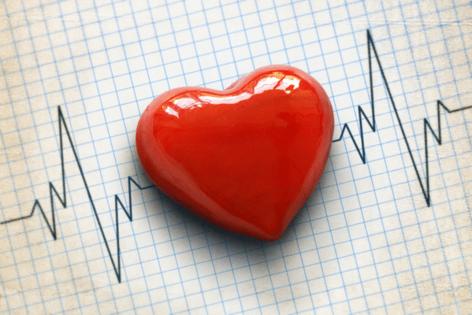If her heart artery had torn an inch higher, 'it would have been fatal'
Published in Mom's Advice
A week after giving birth to her second daughter, Amelia Laytham's focus was on baby Jocelyn's and big sister Vera's sleep schedules; on breastfeeding her newborn; on the balancing act that parents navigate.
The morning she was scheduled to bring Jocelyn to the pediatrician for her first checkup, Amelia woke up feeling like someone was sitting on her chest.
"I could breathe just fine," Amelia said. "I didn't feel any kind of strain on my chest, only that my heart seemed to be struggling to pump. Plus, my left arm and leg had been numb, but I just attributed that to holding a baby all the time."
She was sweating a lot that morning, too. Even a routine trip up and down the stairs caused her to perspire. But it was August, and everyone was sweating. Still, it was clear something was going on. Amelia and her husband, Chris, never imagined the problem was her heart. Why would they? Amelia was 29 and in good health.
At the pediatrician's office, the Laythams told a nurse about Amelia's symptoms. Immediately, she led Amelia to an examination room while Chris took the baby to another exam room for her checkup. When he told the pediatrician why his wife wasn't with him, she dashed off to check on Amelia.
The results of a heart test led to Amelia being rushed to the hospital. There, doctors determined she needed more advanced care than their facility offered. So, Amelia was taken by ambulance to the hospital where, only a week earlier, she had given birth to Jocelyn.
Doctors there determined she was having a heart attack, the kind caused by a spontaneous coronary artery dissection, or SCAD, a tearing of a coronary artery wall– in her case, between its second and third layer. That tear was blocking her blood flow.
"I was told that had the tear occurred an inch higher, it would have been fatal," Amelia said.
As is often the case with SCAD, there was no definitive answer as to why it happened to Amelia, although women are more likely than men to experience it. Not until Jocelyn was well into her teens did Amelia learn that she had another condition that may have caused it.
After her heart attack, Amelia spent a week in the ICU and then went home. She followed her doctors' orders to rest and stay on blood thinners for a month. Because there was no blockage in her heart, no surgery was needed.
Chris, a stay-at-home dad, kept the household running with the help of his parents, who were visiting from Idaho, as well as Amelia's sister and mother. With a newborn, a toddler, a potentially fatal diagnosis with no clear reason behind it, the stress level could have been off the charts.
But Chris and Amelia take life in stride. They met in an online chat room one New Year's Eve when he was living in Idaho and she in Pennsylvania. That first night, they talked for four hours. A month later, they picked up the conversation and talked for hours more every day. Amelia flew out to meet him, and he knew she was the one. He moved to Philadelphia, and they've been each other's rock ever since. They'll soon relocate to New York City.
"She is very strong-willed," Chris said, "and knowing she had survived the heart attack, I knew she could handle the recovery."
After three months, Amelia's medical team determined she was back to normal. Still, she said, for the first few years, she was especially sensitive to anything that could be construed as a symptom of a heart issue.
"Every time I felt a minor chest discomfort, I thought, 'Is it heartburn or a heart attack?'" she said.
But life went on, and the further from the heart attack she got, the less she thought about it. Then, when she was 40, she was diagnosed with breast cancer. After undergoing a double mastectomy and chemotherapy, she was tested for and found to have a condition called fibromuscular dysplasia. This abnormal development or growth of cells in the artery walls can cause blood vessels to bulge or become narrow. This issue may have had something to do with her SCAD.
Her health issues weren't over. A routine heart scan last December revealed that Amelia – then 47 – had a blood clot. She was again put on blood thinners. Still, she is, as Chris said, as tough as they come.
"Cancer is the No. 2 killer of women, and heart disease is No. 1," she said. "I have both, but I just have to live my life. I do things that bring me joy."
She encourages her friends to take their health seriously. Women – especially Asian American women such as herself, she said – "typically don't see a doctor until they're dying. The attitude is that you need to handle everything on your own."
But, as she knows all too well, nobody can do that. Eighteen years after Jocelyn's birth, she's ever grateful to the nurse at the pediatrician's office who took her symptoms seriously, and she's ever grateful for every moment spent with her daughters and Chris.
"People say, 'You have such a positive attitude,' but what else can I do?" Amelia said. "There will be good days and bad days, but you need to give yourself grace. I have a long life ahead of me."
____
Stories From the Heart chronicles the inspiring journeys of heart disease and stroke survivors, caregivers and advocates.
American Heart Association News covers heart and brain health. Not all views expressed in this story reflect the official position of the American Heart Association. Copyright is owned or held by the American Heart Association, Inc., and all rights are reserved.










Comments